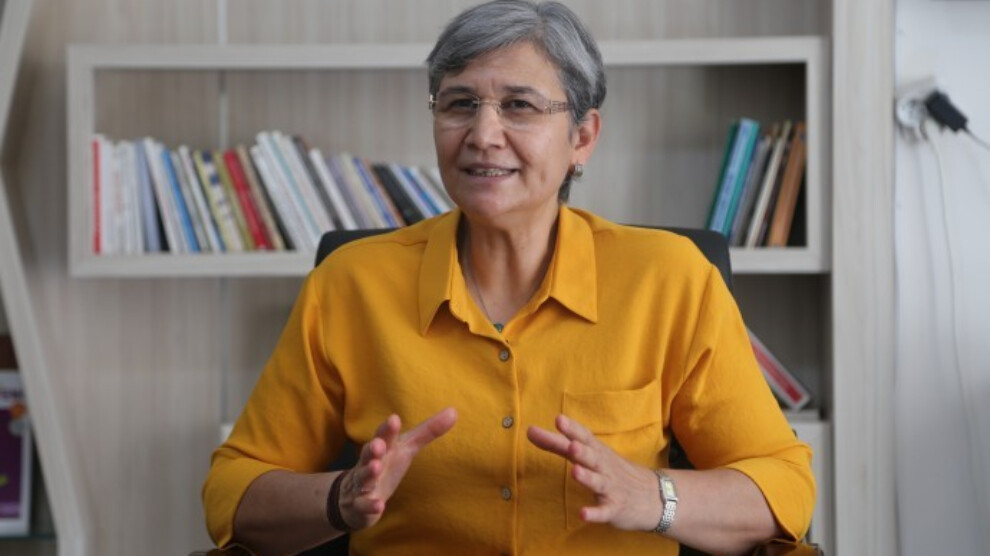Leyla Güven transferred to Elazığ
Kurdish politician Leyla Güven has been transferred to a prison in Elazığ. For several hours her whereabouts were unknown, lawyers received no information about the transfer.
Kurdish politician Leyla Güven has been transferred to a prison in Elazığ. For several hours her whereabouts were unknown, lawyers received no information about the transfer.

Kurdish politician Leyla Güven has been transferred to a maximum-security prison in the province of Elazığ, announced her daughter, journalist Sabiha Temizkan, on Twitter on Tuesday evening. Previously, Güven's whereabouts had not been known for several hours. Neither her relatives nor her lawyers were informed of the transfer from the women's prison in Amed (Diyarbakir) to the Type E prison in Elazığ. The defense team of Güven learned about the transfer during an attempted client visit on Tuesday afternoon. The prison authorities did not provide any information about the location of Güven's placement.
Leyla Güven was sentenced on Monday by a Turkish court in Amed to 22 years and three months imprisonment on dubious terror charges. Among other things, she was accused of "forming and leading a terrorist organization" - meaning the Kurdistan Workers' Party (PKK). The court based the decision on the fact that Güven is part of the gender-parity dual leadership of the civil society umbrella organization DTK (Democratic Society Congress). Other charges against the Kurdish politician included "inciting the population to unlawful gatherings and demonstrations" and "unarmed participation in unlawful demonstrations that did not disperse despite orders." At issue here are speeches Güven made at rallies and demonstrations against the Turkish invasion of the northern Syrian canton of Afrin in early 2018.
On Monday evening, Leyla Güven was arrested in Amed at the apartment of her former faction colleague Semra Güzel. Because no prosecutor was said to be present at the courthouse, police officers took the 56-year-old politician to the anti-terror department, where she was forced to spend the night. It was not until Tuesday morning that she was transferred to the court for the reading of the verdict and then handed over to the Women's Correctional Center in the province. The reasons behind Güven's transfer to Elazığ are still completely unclear. HDP deputy parliamentary group leader and renowned human rights lawyer Meral Danış Beştaş spoke of an application of the so-called dispersal policy in a broadcast on the anti-government exile channel ARTI TV. Beştaş emphasized that the hours between Güven's arrest and transfer to a prison were marked by demonstrative arbitrariness.
Dispersal method as an instrument of double punishment
The penitentiary method of "dispersal" consists of transferring prisoners to distant prisons in order to isolate them from their social environment and punish their relatives by making them travel excessively long distances. In almost all cases, the prisoners involved are political prisoners. Although the penal laws stipulate that they must serve their sentences close to home, this is only a marginal note for the Turkish judiciary, which is of no further interest. In doing so, the judiciary is also ignoring a ruling by the European Court of Human Rights, which sees this method as a violation of Article 8 of the European Convention on Human Rights.
This is not the first time Güven has been arrested. In 2009, she was jailed as part of the internationally criticized "KCK operations" and was released only after five years. At the time of her arrest, Güven was mayor of the Viranşehir district of Urfa.
In January 2018, she was again remanded in custody, this time for her criticism of the war of aggression against Afrin. At the time, she initiated a 200-day hunger strike action in November of the same year for the lifting of solitary confinement conditions for PKK founder Abdullah Öcalan, who has been imprisoned on the prison island of Imrali since 1999, with over 7,000 people participating at last count. Last June, Güven was arrested again, only a few hours after the parliament in Ankara had revoked her mandate and thus also her immunity. The reason given was the now legally binding verdict in the KCK trial.
RELATED NEWS: